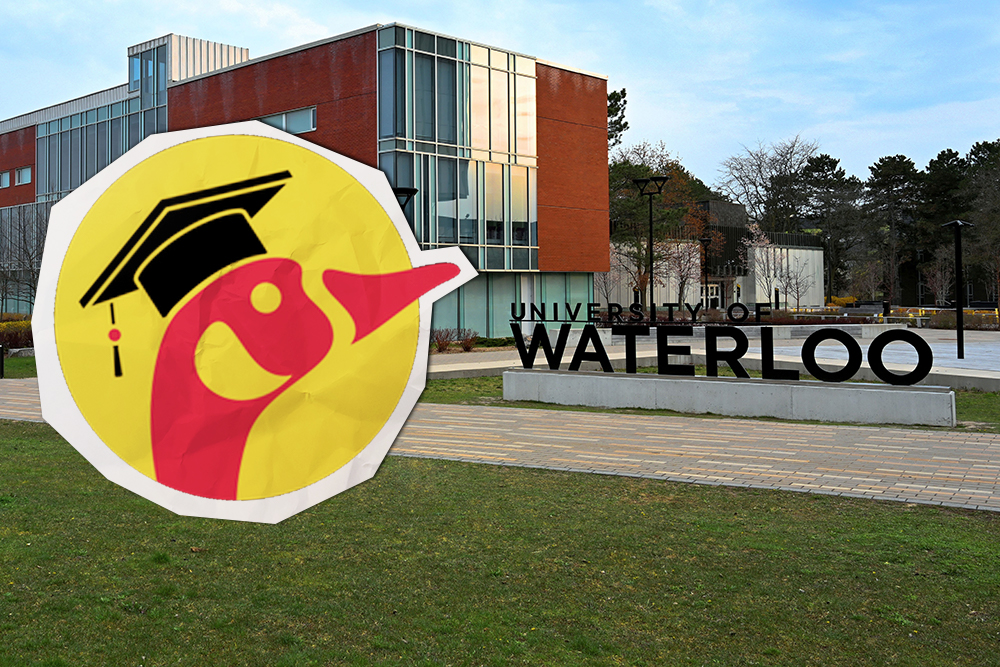
In 2020—a year in which students faced a global pandemic, sky-high housing costs and a subpar virtual learning experience—the University of Waterloo (UW) made $117.5 million in net profit, largely thanks to the $595 million the school brought in from academic fees, the largest line in their revenue report. UW is a money making institution that requires the labour of teaching assistants, research assistants and sessional lecturers for its world-class education and research, all of which is extremely profitable. These workers are necessary for the university to function, but have no say over their working conditions, as UW is one of the last Ontario universities without a teaching assistant (TA) union.
TAs are scheduled to work up to 160 hours per term, 20-40 hours more than at similar schools. Some TAs work more, without additional pay, as they feel they have no choice. There is no safe avenue to report unpaid overtime or even harassment and unsafe working conditions. Up until last year, the University of Waterloo had the second-lowest hourly TA pay rate in the entire province. In response to the union drive, the university has increased this rate, but many students aren’t making any more money as academic grants and scholarships have been clawed back to negate the effect of this pay increase. Graduate students and sessional lecturers are living at the poverty line. With inflation and the housing crisis worsening, these workers are effectively getting a pay cut.
The working conditions of graduate students during the pandemic has created a mental health crisis. The mental health support resources provided by the university administration have been limited to Zoom seminars on self-care and sending emails listing crisis hotline and hospital phone numbers. The administration has created a work environment that pushes graduate students beyond reasonable limits, and then provides only minimal support.
How can these students find the time and effort to mark carefully or plan quality tutorials when they are overworked, underpaid and in constant stress? The answer is they can’t, but graduate students are fighting to change that. OrganizeUW, a grassroots campaign to unionize the academic workers at UW, was launched last year. This is currently one of the largest active union drives in North America. The campaign is being supported by the Canadian Union of Public Employees (CUPE), Canada’s largest union. Thousands of graduate students and other university workers have little power so long as they are atomized, but organized together, workers have leverage to improve pay and working conditions. To win, OrganizeUW must draw upon the best fighting traditions of the labour movement, mobilizing members and unifying with undergraduate students on campus to address the pressing needs of workers and students at the university.
The OrganizeUW campaign is part of a growing realization by workers around the globe that they must organize or face ruin. Capitalism is in crisis, and there is a huge question of which class will pay for the crisis. For decades, even in rich countries, workers have faced stagnating wages, lower health and safety standards and poor mental health supports, all while being overworked and subjected to a rising cost of living. This has now reached a new tenor. Housing costs are out of control, and inflation has now begun to seriously cut into the real value of wages. These moves to make the working class pay for the crisis have been provoking a growing response. In the fall of 2021, there have been enormous strike waves in the U.S. and Turkey and a general strike in South Korea. There is also a growing realization of the need to organize the unorganized, especially in highly exploited sections of the workforce such as gig workers and Amazon warehouse workers. OrganizeUW’s efforts to organize workers at the University of Waterloo are similarly courageous. These struggles must be seen as the beginnings of a serious fight against the capitalist system itself, with all its crisis, exploitation and oppression.
No doubt the administration will attempt to divide undergraduate and graduate students in the hopes of weakening this important struggle. As socialist students on campus, we wholly reject this narrative. Students on campus have the same interests, and the same enemies, as their teachers and staff. It is in the interests of both undergraduate and graduate students that workers are properly paid, and that education is free and well-funded. The administration that consistently increases tuition for all students is the same administration that continues to underpay and disregard university workers. All students and workers must stand in solidarity with this important unionization effort. An injury to one is an injury to all! Victory to OrganizeUW!



